On October 13, the Ixil genocide trial is set to open once again against former dictator Efraín Ríos Montt and José Mauricio Rodriguez Sánchez, former head of military intelligence, in the second attempt to retry the case after the 2013 trial, verdict, and sentence convicting Ríos Montt of genocide. While affirming the continued validity and historic importance of the 2013 sentence, witnesses from the trial have agreed to reappear in court and share their stories publicly. The witnesses continue to reaffirm the genocide sentence against Ríos Montt, seek justice against Rodriguez Sánchez, and pursue justice against the corrupt Constitutional Court judges who voted to suspend the genocide sentence. That decision, called into legal and ethical question, has led to this second attempt to re-try the case, with the defendants now being tried separately.
NISGUA stands in solidarity with the Association for Justice and Reconciliation (AJR), as survivors and heroes continuing the struggle for justice for their loved ones. We remember and honor the testimonies we heard during the 2013 trial and are led by the example and voice of survivors. Here we share words from three leaders of the AJR, and their reflections on this next phase of the legal process:
“We questioned if it makes sense to keep going with this case, since it keeps stopping and starting – it’s a sick game they’re playing with justice… But when we talk about justice for a crime like this, a crime that stands out among all crimes, it’s not about seeing someone behind bars. It’s about making the communities of the world aware
[of what happened]. That’s why we’re going to keep going… There’s already a document that says Ríos Montt is guilty. But more than taking away the freedom of those responsible, it’s about making a difference in history, and at the very least making it known that we will not let those responsible remain in impunity, that we will continue to struggle to make sure they are judged.”
“We see that what the government is looking to do today is part of the same strategy that the military used in the 80’s. The military asked for resources, saying the country needed them. And then they used those resources to buy arms and commit genocide against their own people. And today, they say the country needs development, when really they’re looking to take our natural resources and commit ecocide.”
“There’s still so much death and discrimination in Guatemala and it’s because there’s still no justice. The genocide killed many people and today corruption does too. Since Guatemala still doesn’t have justice, I’m honestly grateful to be able to keep going forward with the case.”
For several members of the Association for Justice and Reconciliation (AJR), the search for justice extended past their own lifetimes. Already, four Ixil genocide witnesses – Jacinto de Paz, Clemente Vásquez Mateo, Pedro Brito Chávez, and Miguel Rámirez Matom – have passed away without witnessing full state recognition of its complicity in the genocides of its peoples. In several cases, these same witnesses suffered health problems due to the state’s ongoing denial of access to resources; this systematic denial of resources to indigenous peoples emanates from the same roots of racism and discrimination that allowed for the genocide to occur.
The memory of these four witnesses remains present for the other survivors, as they continue forward in their shared struggle for justice and historical memory, to ensure that these crimes are never committed again. As one leader shared, “The departure of four of our witnesses and friends who have died hurts us, but we will continue in the struggle…Many of us are already grandparents. We don’t want our grandchildren to live what their grandparents lived. And with impunity for those crimes, there is a possibility that that violence will come again.”
Members of the AJR’s board of directors also talked about why international presence and solidarity are important in their work:
“We’ve always had accompaniment and it’s been a support for us, especially when the law is playing with the victims, as if their struggle didn’t matter. But even though our struggle has already been won [with the 2013 conviction of Ríos Montt], we’re willing to keep going forward. We know in Guatemala yes, there was genocide, that’s why we’re willing to go forward. And we ask that international support for our struggle for justice also continues…it strengthens us.”
“It was worrisome to see the court’s resolution [on May 20, 2013], which forced us to restart the process. We’re now starting the process for the third time. The witnesses are willing to go forward, but we also see that the system is manipulating the process and that no one is paying attention to the witnesses’ rights. That’s why we appreciate having international accompaniment.”
NISGUA continues our 17-year long solidarity relationship with the AJR and provides international human rights accompaniment to the AJR through the ACOGUATE coalition. If you would like to stand in solidarity with the AJR, please follow our coverage on Twitter, support our continued presence, or consider becoming a human rights accompanier.

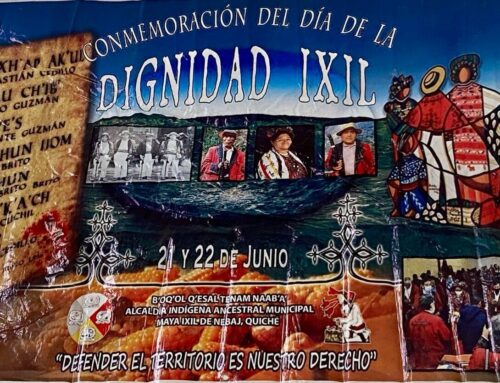
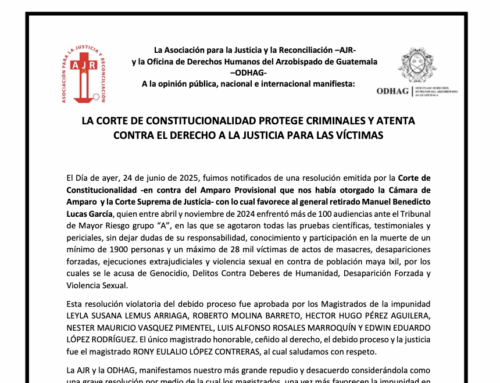
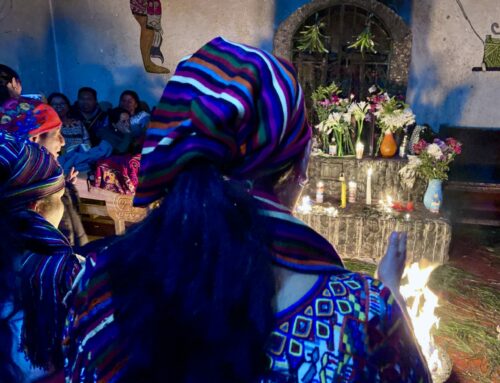
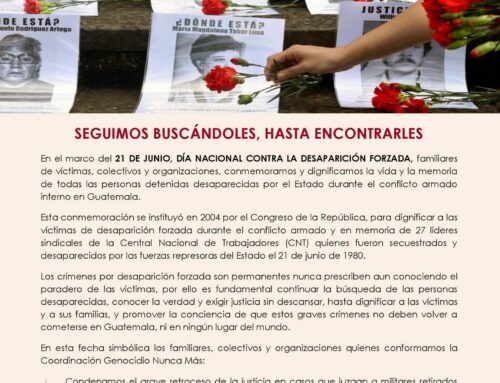
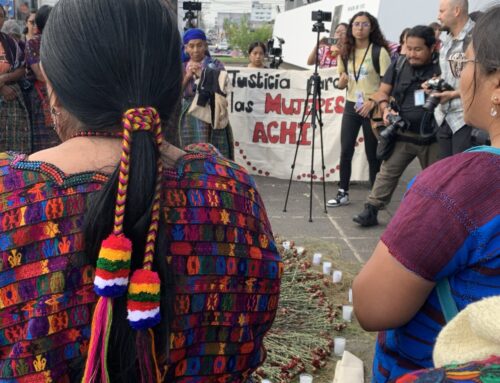
Leave A Comment